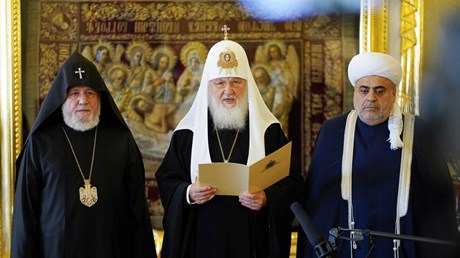One year since the ceasefire in Nagorno-Karabakh, a Russian-led reconciliation summit is the first meeting between spiritual leaders since 2017.

After 17 tries, there is still no peace in Nagorno-Karabakh.
Almost a year ago, Russia brokered a November 2020 ceasefire to end the 44-day war between Azerbaijan and Armenia over the Caucasus mountain enclave. Azerbaijan reclaimed most of its internationally recognized territory occupied since 1994 by ethnic Armenians, who demand independence.
Armenia has been a Christian nation since A.D. 301. Azerbaijan is majority Muslim. But spiritual leaders have been no more successful than politicians or generals at securing reconciliation.
Yet that has not stopped Russian Orthodox Patriarch Kirill I from trying.
“Our religions have a unique peace-making potential,” he stated at last week’s tripartite summit of top clerical leaders. “No matter how difficult Armenian-Azerbaijani relations are at this stage, we believe that it is faith in God, and love, that can help heal the wounds.”
And they are many.
The post–Soviet Union conflict over Nagorno-Karabakh—called Artsakh by Armenians—killed 30,000 people and displaced 1 million. As Azerbaijan recaptured the territory—slightly larger than Rhode Island—last year, another 7,000 were killed. Mutual acrimony has characterized relations, with both sides accusing the other of destroying their religious heritage.
The first meeting of spiritual leaders was held in 1993. The 16th in 2017.
Simply by bringing these leaders together, Kirill achieved a level of success. Standing with Karekin II, the Armenian catholicos on his right, and Allahshukur Pashazade, Azerbaijan’s Grand Mufti of the Caucasus, on his left, he read a joint statement calling for respect for shrines and monuments, resistance to radicalization, and the avoidance of hate ...
from Christianity Today Magazine
via


.gif)

.gif)
.gif)
